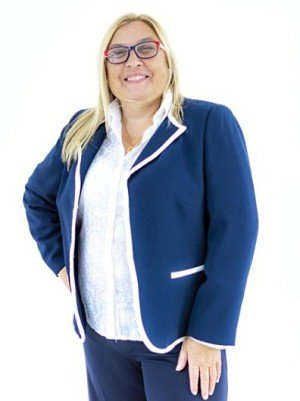 Yvonne Vidal is the founder of My Legal PA Associates based in Marbella. The firm specialises in providing a complete range of legal, administrative, and consultancy services to foreigners throughout Spain, through a team of in-house professionals as well as through a network of strategic partners and connections.
Yvonne Vidal is the founder of My Legal PA Associates based in Marbella. The firm specialises in providing a complete range of legal, administrative, and consultancy services to foreigners throughout Spain, through a team of in-house professionals as well as through a network of strategic partners and connections.
Born and educated in the UK to Spanish parents, Yvonne had a traditional British education whilst, at the same time, she completed the Spanish ESO, the mandatory education required for all native Spaniards. Not only is she perfectly fluent in both Spanish and English but, having grown up in the UK and also being part of a large Spanish family, she has a deep understanding of both British and Spanish cultures.
During a career spanning more than 40 years, Yvonne Vidal has acquired an unprecedented amount of hands-on experience, from working in both corporate and private industry in the UK, USA, and Spain as well as for both the UK & Spanish governments.
It is Yvonne Vidal´s experience that provides the foundation of My Legal PA Associates.
Yvonne, how was the concept for My Legal PA Associates born?
I think the answer to that question is having had to solve problems. Over the past 40 years I have worked in numerous fields, from the Marbella courts to a firm of chartered accountants. In practically every field my role required problem-solving skills, such as when I was a due diligence officer for a merchant bank or when I worked for the British Embassy in Madrid dealing with a myriad of issues that arose on a daily basis.
What are the types of challenges that face foreigners in Spain?
Spain is a beautiful, vibrant country and its people are welcoming. It has so much to offer to foreigners looking either to spend their holiday time here or those seeking to embrace the Mediterranean lifestyle completely and move here, but the bureaucracy can become overwhelming.
This is not only due to the differences in language but also because there is often no clear path to solving a particular problem, especially for someone who does not understand the Spanish culture and how the system works.
There are, of course, the traditional bureaucratic formalities that come with living in Spain, such as obtaining a fiscal number, opening a bank account, or buying a car, but the real problems arise when the paperwork for some reason is not handled correctly at the outset.
This is where I am in my element, solving problems that do not seem to have a solution.
For example, a client came to me who had sold his car, but the buyer did not transfer the car into his own name as promised, and for 3 years the seller had tried to get the paperwork changed into the buyer´s name.
Unfortunately, after the sale, it is incredibly difficult to force the buyer to change the paperwork; it is something that has to be done at the time of sale.
The danger is that the seller remained registered as the owner of the car and thus, technically, responsible for the payment of the car’s taxes, its insurance and, frighteningly so, for any traffic fines such as for speeding.
Within 2 weeks I had arranged for the car to be transferred into the buyer´s name.
Indeed, this is actually a case of seller beware, which is something that most sellers don´t think of. Generally, one would imagine that the buyer would have every interest in putting the car into his own name as soon as possible. Do you have any other examples?
Well, I think I could fill an entire encyclopaedia with my cases but here is another example:
The buyers were looking to purchase a property in Marbella for holiday rentals. In order to obtain a holiday rental licence under Spanish law you need to provide the first occupation licence, which is the original document that certifies that the property can be used as a dwelling. Unfortunately, this property was constructed in an era when the original document was given to the very first buyers, and there was no effective record-keeping system in place to obtain copies.
Regrettably, the seller had not asked the previous owner for a copy of the licence when he bought it, and there did not seem to be any way to get a copy. The community of owners did not have one, and a simple call to the town hall in Marbella would have resulted in a negative answer, as the town hall was not responsible for keeping copies from that period.
It would be impossible for him or these potential buyers to rent the property out short-term if they wanted to be in full compliance with the law.
Effectively, these buyers were going to be unable to purchase their dream property in Spain.
Fortunately, I was brought in to assist and, thanks to my time working at the Marbella courts, I had obtained a deep understanding of how the town hall works. I managed to gain access to the physical archives at the town hall and was able to find, buried amongst the boxes, a copy of this document.
This is something that would be almost impossible for someone who had no understanding of the inner workings of the system to do.

